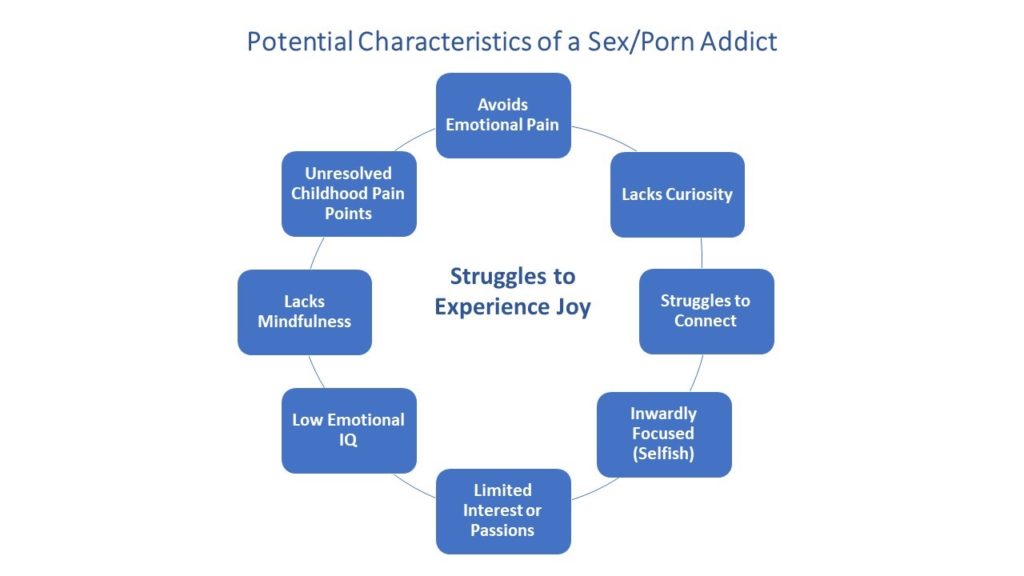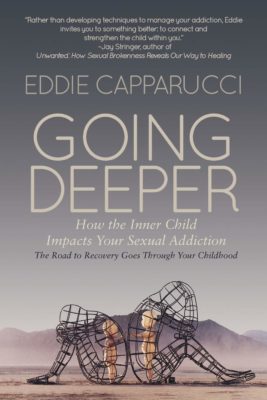By Eddie Capparucci, LPC, CSAS, CPCS
Click HERE for the entire four-part series.
So why is it that learning to manage your sexual or porn addiction is not enough when it comes to the changes needed in recovery?
I received the answer to that question many years ago. I was working with a client who had multiple affairs and had been in treatment for nearly a year. During that time, he had done everything required and had been sexually sober and faithful. One day his wife joined us in a session, and I asked if she was feeling more confident that he would remain faithful.
She sat forward on the couch and leaned toward me and said:
You are asking me if I believe the man sitting next to me has been faithful in the last 12 months. And the only reason I should believe that he hasn’t been is that he’s telling me he hasn’t. However, in the past, he always denied cheating and even told me I was being crazy because I was suspicious.
You need to understand this. I don’t see any other changes whatsoever in his behaviors toward the children or me. He’s still distant and moody. He also seems to be stuck in his head most of the time, not focusing on what we need. And his phone is always in his hand. So why should I trust him? The only difference is he telling me he is no longer unfaithful. And to me, that is not enough to believe.
My eyes were opened wide that day as I heard her concerns and realized that just helping men manage their sex or porn addiction is not enough.
Potential Characteristics of a Sex/Porn Addict
In the first article in this series, I introduced the potential characteristics of men struggling with sex or porn addiction (see chart below). These are character flaws I have seen time and time again in my private practice, and they are responsible for men being unable to develop and cultivate healthy relationships. More than 80% of men I have worked with have issues in seven or more of these critical growth areas.

Over the rest of this series, we will look more in-depth at these weaknesses and what is required to strengthen them. In this post, we look at the first three characteristics: avoids emotional pain; lacks curiosity; and struggles to connect.
Avoids Emotional Pain
At the heart of most addictions is unresolved emotional pain that is being covered up by addictive behaviors. This is especially true for those dealing with sex or porn addiction. The inability to sit and deal with emotional distress leads these individuals to distract themselves and seek comfort.
In most cases, this behavior was learned at an early age. Addicts, when struggling with emotional hurt as children, did not receive the nurturing required to learn how to deal with discomfort in healthy ways. No one ever explained to them it was OK to be upset by the hurtful event that occurred. Instead, they were left to figure out on their own how to rid themselves of their pain.
Having little in the way of worldly experiences and being more emotionally-based in their thinking, they come up with one logical conclusion – I will not think about it. And they do that by distracting themselves. Too much television, food, and fantasy are just a few examples of the tactics they utilize until they stumble across sex. With sex, they find what they perceive to be the greatest distraction of all.
Fast forward 20 years, and these adults are still caught in the same cycle of running away and distracting themselves. Why? Because they do not know how to manage emotional pain. So learning to tolerate and manage emotional pain this is a necessary change for men wanting to sustain their sexual integrity. They must learn that emotional distress, while uncomfortable, will not kill them. They also must understand the benefits that come with being able to deal with emotional pain in healthy ways.
Lacks Curiosity
You may be wondering why becoming more curious would be part of the growth chart for men struggling with sex or porn addiction. The reason is their lack of curiosity results in their inability to go deeper in relationships. In most cases, as children, no one challenged them to be curious about people. Today, as adults, they may be very curious about specific topics or interests, but that curiosity rarely extends to people.
Seeking knowledge about one’s partner and continuously trying to understand that person better strengthens relationships. It is through intimacy-building conversations that relationships flourish. Thus, some believe curiosity is the essential building block of emotional intimacy. And I can assure you that healthy emotional intimacy with one’s partner is an antidote to engaging in unwanted sexual behaviors.
Three keys to improving curiosity are asking open-ended questions, attentively listening instead of trying to formulate your response, and being engaged instead of merely being present. It does not take a lot to become curious, but it does take a desire to do so.
Struggles to Connect
The final character flaw we will examine in this post is the struggle to connect. Again, I find in my work with men that as children they did not have the relationship model where parents demonstrated the essential components of a healthy relationship. Often, there was little in the way of emotional nurturing taking place in the home, which left these kids learning about connecting from television and friends. Now imagine if they did not have friends.
Connecting in a relationship requires an individual to be emotionally available, and for these men, that is like a foreign language. As I tell my men, you would not know emotional intimacy if it hit you in the face. But it is not their fault; they only know what they know. So again, this is an opportunity for men to strengthen their relationship muscles. And the first lesson to learn is that physical intimacy is NOT emotional intimacy.
Typically, these men show their love and feel loved by touching and being sexual. That is why they will comment on how close they feel to their partner after engaging in sex. But physical intimacy is only part of a relationship. A healthy relationship is built on a foundation of emotional connection, with physical intimacy sprinkled in to reinforce the emotional aspect.
These men have it backward. They create the foundation on physical intimacy and sprinkle in emotions. It is no wonder so many spouses end up feeling used and violated.
Being emotionally connect with your partner is an antidote to managing your destructive sexual activities. And emotional connection starts by spending quality time with your partner – that means putting away the phone. It is trying to better know and understand your partner by being curious. It is being vulnerable and showing a side of yourself that you have locked away from the world. While that likely sounds incredibly frightening, it will be one of the most amazing experiences you will ever have in your life.
In part three of this series, we will examine being inwardly focused, limited interests or passions, and low emotional IQ.
* * * * *
 Eddie Capparucci is a Christian therapist and licensed by the State of Georgia. He is certified in the treatment of sexual and pornography addiction, and he and his wife, Teri, have a private practice working with men struggling with sexual and pornography addictions, as well as their wives who are dealing with betrayal. Among his many clients, Eddie has worked with professional athletes, including NFL and MLB players and television personalities.
Eddie Capparucci is a Christian therapist and licensed by the State of Georgia. He is certified in the treatment of sexual and pornography addiction, and he and his wife, Teri, have a private practice working with men struggling with sexual and pornography addictions, as well as their wives who are dealing with betrayal. Among his many clients, Eddie has worked with professional athletes, including NFL and MLB players and television personalities.
He is the creator of the Inner Child Recovery Process (ICRP) for the treatment of Sexual and Pornography addiction. This unique treatment method helps individuals get to the root issues of their addiction and provides them with the tools and insight to manage the disorder. It is endorsed by many leaders in the sex addiction field. The Inner Child Recovery Process is the subject of his new book, Going Deeper: How the Inner Child Impacts Your Sexual Addiction. He also is the host of the webcast entitled Getting to the Other Side: Helping Couples Navigate the Road to Recovery.
